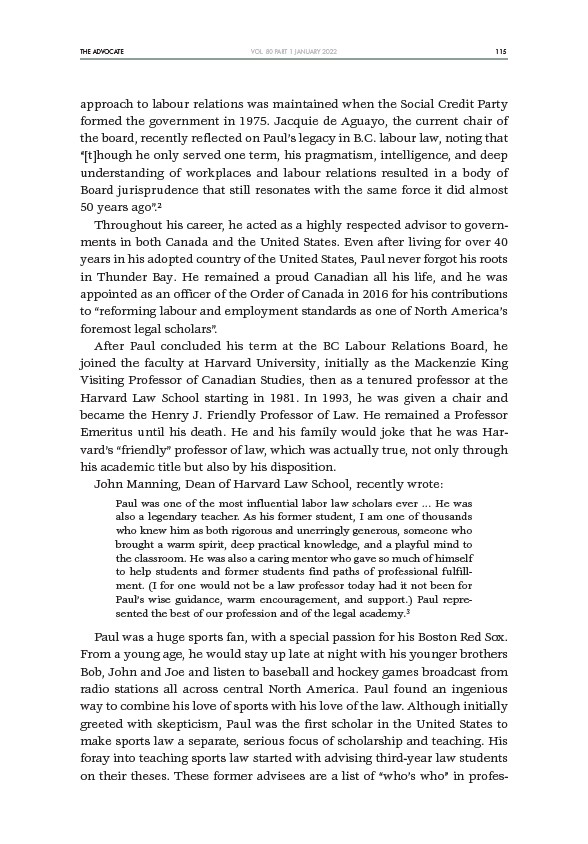
THE ADVOCATE 115
VOL. 80 PART 1 JANUARY 2022
approach to labour relations was maintained when the Social Credit Party
formed the government in 1975. Jacquie de Aguayo, the current chair of
the board, recently reflected on Paul’s legacy in B.C. labour law, noting that
“though he only served one term, his pragmatism, intelligence, and deep
understanding of workplaces and labour relations resulted in a body of
Board jurisprudence that still resonates with the same force it did almost
50 years ago”.2
Throughout his career, he acted as a highly respected advisor to governments
in both Canada and the United States. Even after living for over 40
years in his adopted country of the United States, Paul never forgot his roots
in Thunder Bay. He remained a proud Canadian all his life, and he was
appointed as an officer of the Order of Canada in 2016 for his contributions
to “reforming labour and employment standards as one of North America’s
foremost legal scholars”.
After Paul concluded his term at the BC Labour Relations Board, he
joined the faculty at Harvard University, initially as the Mackenzie King
Visiting Professor of Canadian Studies, then as a tenured professor at the
Harvard Law School starting in 1981. In 1993, he was given a chair and
became the Henry J. Friendly Professor of Law. He remained a Professor
Emeritus until his death. He and his family would joke that he was Harvard’s
“friendly” professor of law, which was actually true, not only through
his academic title but also by his disposition.
John Manning, Dean of Harvard Law School, recently wrote:
Paul was one of the most influential labor law scholars ever … He was
also a legendary teacher. As his former student, I am one of thousands
who knew him as both rigorous and unerringly generous, someone who
brought a warm spirit, deep practical knowledge, and a playful mind to
the classroom. He was also a caring mentor who gave so much of himself
to help students and former students find paths of professional fulfillment.
(I for one would not be a law professor today had it not been for
Paul’s wise guidance, warm encouragement, and support.) Paul represented
the best of our profession and of the legal academy.3
Paul was a huge sports fan, with a special passion for his Boston Red Sox.
From a young age, he would stay up late at night with his younger brothers
Bob, John and Joe and listen to baseball and hockey games broadcast from
radio stations all across central North America. Paul found an ingenious
way to combine his love of sports with his love of the law. Although initially
greeted with skepticism, Paul was the first scholar in the United States to
make sports law a separate, serious focus of scholarship and teaching. His
foray into teaching sports law started with advising third-year law students
on their theses. These former advisees are a list of “who’s who” in profes-